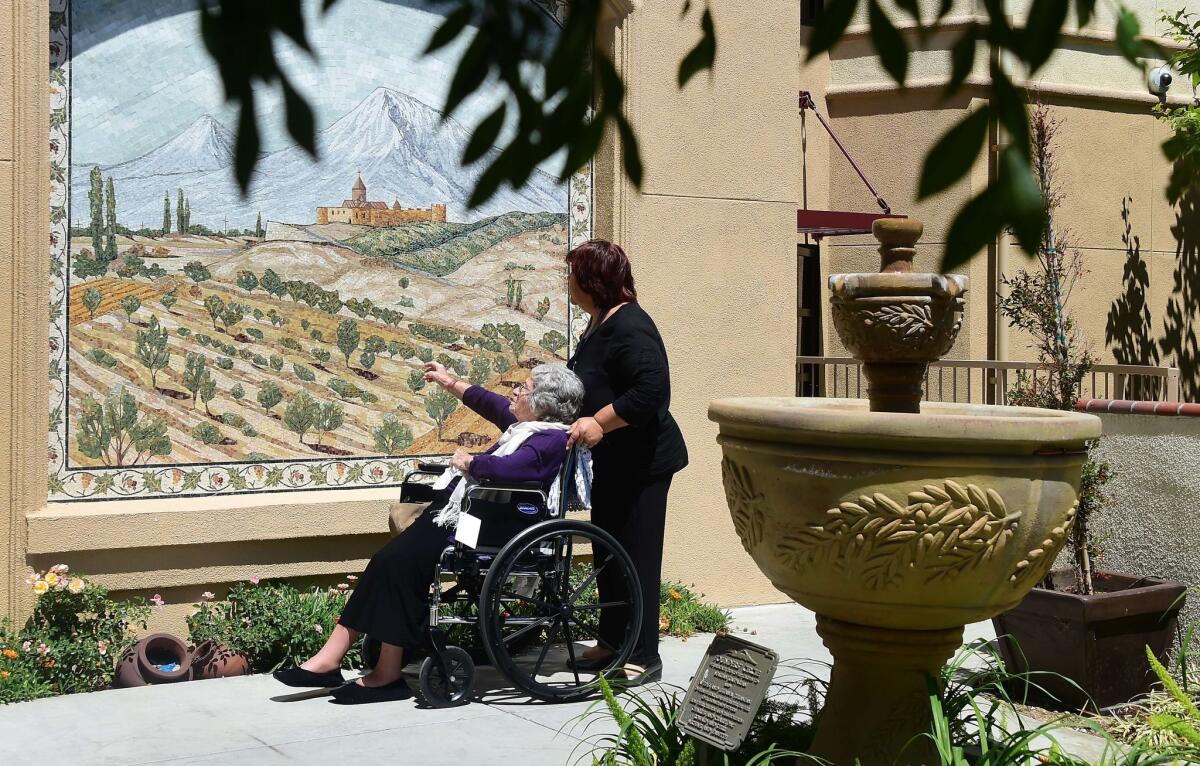As centenary of Armenian massacre nears, ‘genocide’ dispute sharpens

The Turkish government on Monday offered condolences to descendants of Armenians killed in 1915, when the Ottoman Empire embarked on a campaign of terror and atrocity that many in the Western world have deemed the 20th century’s first genocide.
As Armenians the world over prepare to mark the anniversary of the beginning of the massacre that historians say took as many as 1.5 million lives, Turkey holds fast to its rejection of the label that entered the lexicon of inhumanity only three decades later.
Genocide -- from the Greek and Latin root words for race and killing -- was a term first used by Polish lawyer Raphael Lemkin in his 1944 report on “Axis Rule in Occupied Europe,” which included proposals for redress of the crime defined as “the destruction of a nation or an ethnic group.” Lemkin used the word in reference to the Holocaust but said the Armenian atrocities also came to mind.
Broader definitions of “genocide” suggest that such annihilations are deliberate attempts to wipe out a population, the point where modern-day Turkish leaders depart from the growing consensus that their Ottoman forebears targeted Armenians for extermination. Ankara officials have acknowledged that atrocities were committed in the early years of World War I but contend that the Armenian death toll has been grossly inflated and that most of those who died succumbed to the brutalities of war and dislocation.
“We once again respectfully remember Ottoman Armenians who lost their lives during the deportation of 1915 and share the pain of their children and grandchildren,” Turkish Prime Minister Ahmet Davutoglu said in his message of condolence Monday.
But he criticized what he cast as an Armenian lobby to brand the wartime tragedies a concerted campaign of “genocide” for which today’s Turkish leaders should take responsibility and make amends.
“To reduce everything to a single word, to load all of the responsibility on the Turkish nation … and to combine this with a discourse of hatred is legally and morally problematic,” Davutoglu said.
As Christians in a predominantly Muslim empire, the Ottoman Armenians were suspected of collaborating with pre-revolutionary Russia when World War I broke out, provoking German-allied and ultranationalist Ottoman leaders to declare them enemies of the state. Savage village-by-village mass killings followed, as did the forcible expulsion of the Armenian population from eastern Anatolia that pushed hundreds of thousands into death marches into the Syrian desert, where they died for lack of food, water or shelter.
Diplomatic records from embassies in Syria a century ago noted the discovery of corpses strewn along desert paths from eastern Anatolia and of the arrival of starved, sun-scorched and dehydrated stragglers who survived what the Turkish government refers to as “resettlement.”
Pope Francis stirred the decades-old controversy with his reference last week to the Armenian slaughter having been “the first genocide of the 20th century.” Ankara recalled its ambassador from the Holy See in protest of the pontiff’s description of the atrocities that began April 24, 1915.
Twenty-three countries and 43 U.S. states have acknowledged the Armenian massacre as a genocide, and the approaching centennial has stirred indications that others, including European powerhouse Germany, will follow suit before Friday’s memorial observances.
German Chancellor Angela Merkel’s spokesman said Monday that the Berlin government would support a parliamentary resolution planned Friday declaring that the slaughter of Armenians constituted genocide. Most European states have already applied that term and condemned the Ottoman crimes. Switzerland, Italy, Greece and Slovakia have made it a crime to deny that genocide occurred against the Armenians.
As a candidate in the 2008 election, President Obama called for recognizing the Armenian genocide but has refrained from applying the term on behalf of the United States, in a bow to the sensitivities of Turks who are key allies in the North Atlantic Treaty Organization and in the fight against Islamic extremism. But after the shifts indicated by the Vatican and Berlin, analysts have predicted, Obama may yet refer to genocide when remembrances for the victims get underway Friday.
Follow @cjwilliamslat for the latest international news 24/7
More to Read
Start your day right
Sign up for Essential California for news, features and recommendations from the L.A. Times and beyond in your inbox six days a week.
You may occasionally receive promotional content from the Los Angeles Times.







